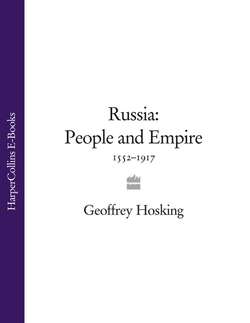Читать книгу Russia: People and Empire: 1552–1917 - Geoffrey Hosking - Страница 9
C. Russia as empire – conclusions57
ОглавлениеIn the light of modern European imperial experience, mostly overseas and commercial, Russia looks decidedly odd. But that oddness largely fades if one examines it in the light of Asiatic or indeed pre-modern European experience, say that of Rome. Like an Asiatic empire, the Russian one created a supra-national elite with a strongly military ethos to integrate and rule the various subordinate peoples in their charge. It operated by gradually incorporating all those peoples more closely in the structure of the empire. Local tribute-gathering was integrated into the imperial fiscal system; tribal leaders were subordinated to the army command or to St Petersburg ministries; imperial law was given precedence over indigenous custom; Russian peasants or Cossacks were encouraged to move in and settle. All this took place without any presumption that ordinary Russians were superior to other peoples of the empire. Rather the reverse: Russians bore all the burdens of serfdom, from which some other peoples were exempted. All peoples, Russians included, were the raw material of empire, to be manipulated or dominated as seemed expedient to its unity and strength.
Let us sum up the main distinctive features of this empire.
1 It was an overland military empire, not only at the stage of conquest and defence of a new territory, but usually in its long-term administrative provisions, especially in areas considered vulnerable to insurrection or to outside incursion, like Poland or the Caucasus. This did not mean that trade was non-existent, but it was certainly not paramount, and it was often closely associated with the military. This gave military leaders the chance of power and profit in the localities where they exercised their command. In this respect, the Russian empire resembled the Roman, though it lacked traditions of citizenship, and the dynasty remained strong enough to prevent any military leader making a bid for supreme authority.
2 The authorities’ economic and fiscal policies gave priority to maintaining the armed forces and the administration. They tended to work in such a manner as to impede the mobilization of the economic potential of the empire, its population and resources.
3 The church played a relatively minor role. This is at first sight surprising, since at certain crucial phases the expansion of Russia took on the form of an anti-Islamic crusade, as in Spain. But in Asiatic empires there is no place for an independent church: ideology is part of the state’s armoury, and the ruler rules with the ‘mandate of heaven’.
4 There was usually no distinction between metropolis and colonies. Annexed territories became full components of the empire as soon as practicable. The stability of the empire was maintained over time by co-opting local elites and integrating them into the Russian nobility and bureaucracy. This co-option had the effect both of making the empire multi-national in principle and of widening the gap between elites and masses of all ethnic groups, including the Russians themselves. On the other hand, relations between the diverse peoples were markedly less racist than in, say, the British Empire. On the mass level, the worst relationships were between nomadic and sedentary peoples, with the sedentary ones steadily gaining ground, and between the Islamic and Christian peoples of the Caucasus.
5 The Russian culture and language were tangible integrating factors for most ethnic groups, but did not succeed, as they did in China, in obliterating and replacing other cultures. Whereas in China high culture was endogenous and worked along with the official ideology in maintaining order and social integration, in Russia high culture was to a large extent borrowed from outside and became subversive of official values. China was the heartland of Asia, while Russia was on the periphery of Europe, with all the advantages and disadvantages which that position entailed.
6 The empire was permanently open to the surrounding world, to both trade and invasion. Isolationism was not an option: Russia could not become ‘the middle kingdom’ in proud detachment, like China. Foreign and military policy were always crucial. Even when stability and security were attained on the Asian frontiers, they were never complete in the direction of Europe, from where the most dangerous and destructive invasions came, since the European states were technically and culturally on the whole more advanced. That is why the major crises came from there too.
7 At all times the survival of the empire and the maintenance of its territorial integrity were the paramount priorities for Russia’s rulers, before which national, religious, economic and other priorities invariably yielded. The Russian imperial sense of identity was powerful: it rested on pride in the size and diversity of the empire, as well as on military victories. As Karamzin put it in his History of the Russian State, ‘If we look at the expanse of this unique state, our minds are stunned: Rome in its greatness never equalled it … One need not be a Russian, only a thinking individual, to read with admiration accounts of the history of a nation which, through its courage and fortitude, won dominion over one-ninth of the world, opened up countries hitherto unknown, brought them into the universal system of geography and history, and enlightened them in the Divine Faith.’58 Thus Russian national identity tended to be subsumed in that of the empire, whose values were in principle multi-national. That worked well enough until the other European powers, Russia’s bitter rivals, started to become nation-states.
